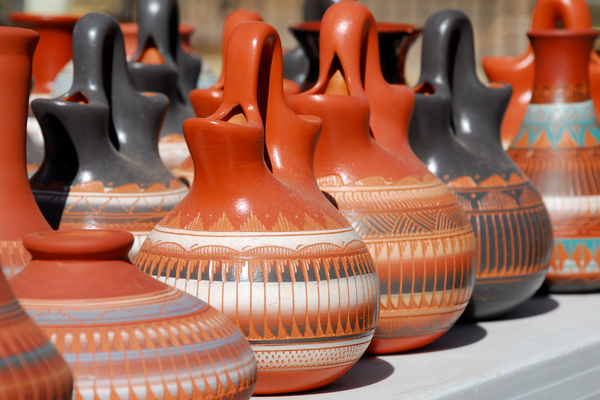
- Details
- By Darren Thompson
The Santa Fe Indian Market, the world’s largest and most prestigious North American Indian art market, wrapped up its centennial event this past weekend to large crowds. It was the first full market since 2019 and included a juried art show, gala, performances, Indigenous fashion shows, a crowd clothing contest, presentations, and an art market that generates millions of dollars for Native American fine art.
Organized by the Southwestern Association of American Indian Art (SWAIA), the Santa Fe Indian Market features up to 1,000 American Indian artists and draws approximately 100,000 people, generating up to $160 million for artists throughout the two-day event.
“Thank you SWAIA for making this market such a success for the artists, performers and to the many collectors and art lovers who came out to see us,” Native American Art Magazine posted on Instagram. “We appreciate you supporting and recognizing the importance of supporting Native arts and culture.”
The first market took place at the Sante Fe plaza 100 years ago and was coined “Indian Market.” American Indian artists from the Southwest gathered and sold woven rugs, jewelry, pottery, beaded items, Kachinas, moccasins, and other traditional American Indian crafts. The market attracted many people — especially wealthy white people — and it grew into a thriving market that has generated billions of dollars while featuring artists from the United States, Canada, and beyond.
The growth of Indian art markets led to an increase in forged arts and crafts that appear to be Indian-made, but are not. Misrepresentation of American Indian art has been illegal since 1935 when the Indian Arts and Crafts Board was formed, but it was rarely enforced. Punishment included up to $500 in fines and a maximum of 6-month jail time.
The Indian Arts and Crafts Act of 1990 became a federal law that same year, making it illegal for non-Indians to claim or represent that their artwork was created by a person from a federally or state-recognized tribe. Individuals who violated the Indian Arts and Crafts Act could face a fine of up to $250,000, a 5-year prison term, or both.
Since 1922, The Santa Fe Indian Market has awarded Best of Show winners to some of Indian Country’s most renowned arts, such as beadwork, pottery painting and basketry. This year’s honor included a $30,000 cash prize and was awarded to Russell Sanchez, San Ildefonso Pueblo. Sanchez’s winning piece — “100 years in the making!” — is a polychrome jar crafted with clay harvested from San Ildefonso inlaid with nearly 400 turquoise and hematite beads.
Sanchez has been showcasing his art at the Santa Fe Indian Market for 50 years. This is his first Best of Class award.
Best of Class awards also went to Ernest Benally (Navajo) in Jewelry; Cara Romero (Chemehuevi) in Painting, Drawing, Graphics & Photography; Manueal Chavarria (Hopi) in Wooden Pueblo Figurative Carving & Sculpture; Ryan Benally (Diné) in Sculpture; Ahkima Honyumptewa (Hopi) in Textiles; Glenda McKay (Ingalik Athabascan) in Diverse Arts; Juanita Growing Thunder Fogarty (Assiniboine Sioux) in Beadwork & Quillwork; Tobie Mae Patricio (Acoma Pueblo) in Youth (Artists aged 17 and under); and Jeremy Frey (Passamaquoddy) in Basketry.
While fashion isn’t yet a class category, this year’s market included two days of programming dedicated to Indigenous designers, with multiple fashion shows and a trunk show.
“SWAIA is our Indigenous Fashion Week,” Rebekah Jarvey, a fashion designer from the Chippewa Cree Tribe of Rocky Boy Montana, told Native News Online. This year’s market was Jarvey’s first. She was awarded an Honorable Mention ribbon for her Night & Day Mask design.
“This past weekend, there were 11 fashion shows,” she said of SWAIA’s fashion events. “That fulfills my fashion heart.”
More Stories Like This
Watermark Art Center to Host “Minwaajimowinan — Good Stories” ExhibitionMuseums Alaska Awards More Than $200,000 to 12 Cultural Organizations Statewide
Zuni Youth Enrichment Project Takes Top Emerging Artist Apprentices to Phoenix for Artistic Exploration and Cultural Immersion
From Dishwasher to Award-Winning Chef: Laguna Pueblo's Josh Aragon Serves Up Albuquerque's Best Green Chile Stew
Rob Reiner's Final Work as Producer Appears to Address MMIP Crisis
Help us defend tribal sovereignty.
At Native News Online, our mission is rooted in telling the stories that strengthen sovereignty and uplift Indigenous voices — not just at year’s end, but every single day.
Because of your generosity last year, we were able to keep our reporters on the ground in tribal communities, at national gatherings and in the halls of Congress — covering the issues that matter most to Indian Country: sovereignty, culture, education, health and economic opportunity.
That support sustained us through a tough year in 2025. Now, as we look to the year ahead, we need your help right now to ensure warrior journalism remains strong — reporting that defends tribal sovereignty, amplifies Native truth, and holds power accountable.
 The stakes couldn't be higher. Your support keeps Native voices heard, Native stories told and Native sovereignty defended.
The stakes couldn't be higher. Your support keeps Native voices heard, Native stories told and Native sovereignty defended.
Stand with Warrior Journalism today.
Levi Rickert (Potawatomi), Editor & Publisher

